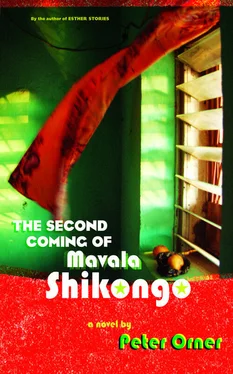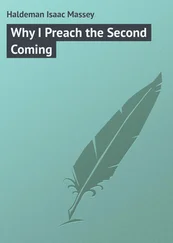After dozing through the service, the boys perked up when Mavala played. She said that in spite of everything she was still Catholic. Whether they wanted her or not. The organ didn’t work very well. The pedals often stuck, and the notes reverberated even longer than they were supposed to, creating a sort of bleeding music that layered on itself, as if every note she played were happening at the same time. By the end of a hymn there was always total cacophony. It never mattered. And the boys irritated the Father further by singing in English. O food of exiles lowly, O bread of angels holy… Their voices carried across the farm — out to Theofilus in the veld; up to the top of the hill by the cross, where Pohamba sat alone, boycotting church.
As a supposed living embodiment of the virtues of speaking English, I made a point of going to church on English night. I sat with Vilho in the back pew and tried not to think of her legs pumping, her feet pumping. Mavala closed her eyes when she played, her head tilted slightly toward her right shoulder.
One Wednesday, I waited for her after it was over and everyone but Vilho had filed out. He often remained. He once told me there was something unusually calm about a just-emptied church. Together, Mavala and I walked up the road toward the principal’s house.
“The wind’s up,” I said.
( The wind’s up. The wind’s down . Sometimes we thought it, said it, just to have something to think, to say.)
“Yes,” she said.
“It was down before.”
“Right,” she said. “It was down before, wasn’t it?”
We passed two boys, Obadiah’s Standard Threes, Siggy and Petrus, who were sitting at the remains of the stolen picnic table, practicing introducing themselves in Obadiah’s King’s English; which king was never clear.
“I should be honored, kind sir, if you would favor me with your name.”
“I was christened Siegfried, but please, I insist, call me Siggy. Dare I inquire of yours, friend of my youth?”
“Ah, kindred spirit! I’m known as Petrus.”
They smoked pencils like pipes. They tipped imaginary hats. From their faces they both seemed to be in great pain. English was often associated with constipation.
The two of us went on up the road. “Like a zoo, this place,” she said.
“They love it when you play.”
“Oh, that.”
“You inspire them.”
Mavala popped her forehead with her palm. “You know what? I forgot the kid.”
We headed down the road again, walked across the soccer field to Antoinette and Obadiah’s. Antoinette was standing at her guard post, her open kitchen window. Tomo was doing a headstand on the steps.
“And how was my angel?” Mavala said.
“He abused my chickens. He fouled my radishes.” She shoved down the window. Antoinette’s smiles were vague and fleet. Her face was blurred in the gloom behind the glass.
Mavala scooped up Tomo and kissed him all over. “How could I forget this boy? A boy such as this boy?”
We started back up the road a second time. She put Tomo down and he refused to walk, so she yanked him through the sand and he plowed along like an evil little water skier. Then she dropped him, and he scuttled after us.
“What were you saying?”
“That your playing —”
“Oh yes. That I inspire. On English night I do inspire!” She paused and looked at me. “Don’t I?”
At the missing picnic table, Siegfried and Petrus were still at it.
“And may I inquire from where your people hail?”
“I was born and bred in Swakopmund, my friend.”
“Oh, the sea. Its extravagances.”
Mavala squeezed my elbow. “What do you call that?”
“At least he’s teaching them some English. Better than I can do.”
“What about teaching them to know who they are? Is that who they are? This place is a hole and he’s president. God bless poor Antoinette.”
“I’m running for vice president of the hole,” I said.
“Happy for you. When are the elections?”
“So why do you play in church? If this place is so doomed. Why give the boys a false sense?”
She didn’t answer. We reached the principal’s house. It was dark. He and Miss Tuyeni had gone to Karibib. Mavala let go of Tomo’s hand and he tore off toward their room. He couldn’t reach the knob, so he stepped back and began ramming the door with his head.
The wind was up. The air had sand in it now and it began to peck our faces. Mavala looked down at the ground as if she’d dropped something. She had a slight widow’s peak I hadn’t noticed.
“Why do you play?”
“Stop thinking about me.”
“I asked —”
“I’m finished with that.”
“With what?”
“Being thought of.”
She left me and went and stomped toward the kid.
Our guru was musing about the difference between certain colonial powers. I don’t remember where we were. We may have been at the urinals in the rank men’s room behind the Mobil station in Karibib, or at the Dolphin in the location, or at our table at the Public Bar, or in a lorry heading back to Goas, a week’s worth of groceries between our knees, sweating, passing around a warm Fanta, so thick it was more like molasses — but it was Fanta and we had it, so we drank it. We might have been out beyond the dry Kuiseb River, where Goas ended and the real desert began, hunting the spoor of that elusive dwarfed hedgehog of the central Namib escarpment. We may have been anywhere where Obadiah felt the need to hold forth, to educate us, to alleviate the burden of our fathomless ignorances.
“Now, the Germans at least were honest. They said they were going to steal our land and they stole our land. They said they were going to kill us, and by God, they killed us. Now, the British were less — how shall we put it? — forthright. They said our land was ours and they stole it. They said they were humanitarians and they bombed the Namas. That was in 1922. A year later, they cut off King Mandume’s head and made a parade of it. So who’s the devil’s favorite? The Germans go before God with reeking, unwashed hands and say, See, Father, see what I have done. Now judge me. The British? Those khakis knock on heaven’s door and offer plum pudding.”
Obadiah paused and straightened the collar of his frayed tweed coat. Wherever we may have been, I can say with certainty he was wearing his piebald-colored tweed coat. He wore it summer or winter, teaching or not, shirt underneath or not. (When he was shirtless, small tufts of white hair spaghettied out between his lapels.)
“Indeed, we’ve had ample opportunity to observe these two giants of the enlightenment. As an aside, I might say that the Boers never had to shoulder the burden of being enlightened… But the Germans and the British! Consider the idiot carnage of what they call the Great War. It even reached us out here at the far-flung edge. Shakespeare versus Goethe in a battle for thorn scrub. One British general wrote to the King, ‘Your Majesty, this land isn’t fit for baboons or Bushmen.’ Now, one may well ask, Then why send men all the way down here to die?”
“Good question,” Pohamba said. “Why in hell —”
“Never ask it. The lives of soldiers, even white ones, have never been worth more than baboons or Bushmen.”
“So fuck them both,” Pohamba said.
“Must you vulgarize?”
“Fuck the Swedes.”
And I seem to remember Obadiah squinting at Pohamba then. So maybe we were outside in the glare. Let’s say we were — us tromping across the veld toward the Erongos.
“What’d the Swedes do to you?” I asked.
Pohamba shrugged. “Fuck Hawaiians.”
Читать дальше












